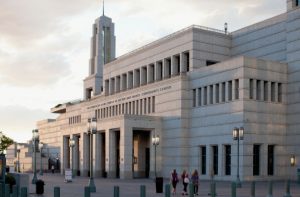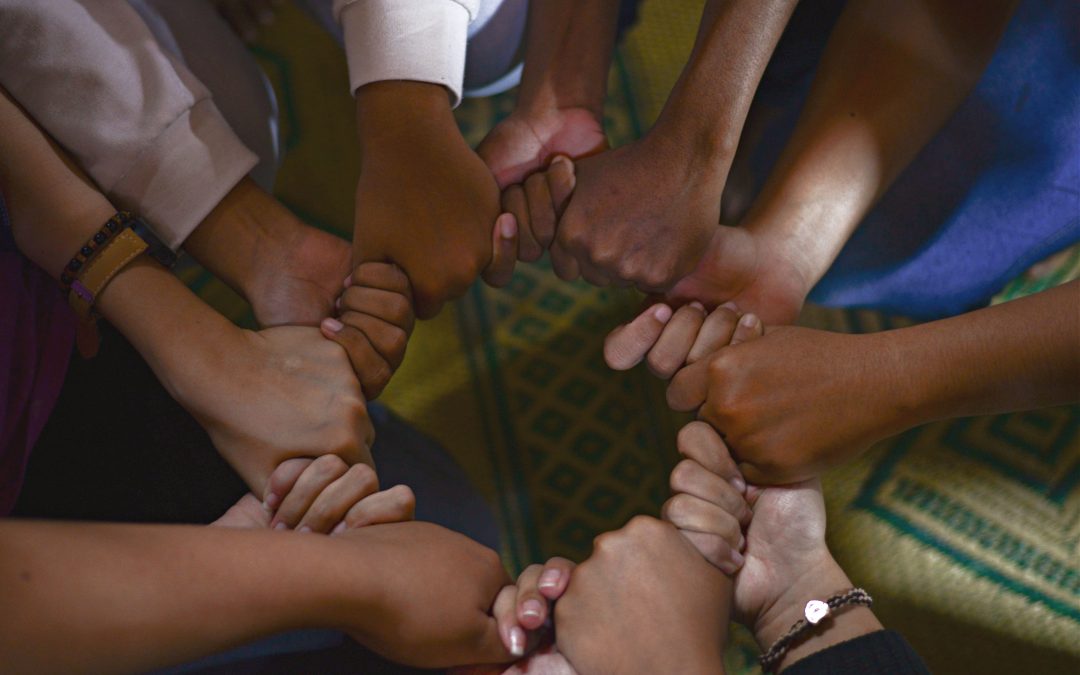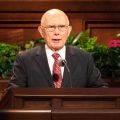Many of us have struggled to make sense out of injustice and civil unrest in the midst of a worldwide pandemic. It seems everyone is cranky these days. Quarantine, claustrophobia, record-breaking temperatures, hurricanes, political nastiness, injustice, and civil unrest all packed into a few months can make for very cranky people. I needed prophets, apostles, and other leaders to speak to my soul during the October 2020 General Conference of The Church of Jesus Christ of Latter-day Saints, and I was not disappointed. As I color-coded my notes at the end of conference, I found myself using a lot fewer colors than in previous conferences, as the themes of this conference were pretty focused. I found the two main themes (at least in my notes) to be adversity and unity. It is unity that I would like to address today.

The Conference Center in Salt Lake City, Utah
Many speakers in General Conference addressed the topic of unity. As one would expect, they all addressed it from different perspectives. Elder Quentin L. Cook reminded us about how important it is to be unified in order to eliminate strife. President Dallin H. Oaks said there is a lot wrong in the United States, but a sense of calm—working through the Constitution—not against it is the avenue Heavenly Father and Jesus Christ want us to pursue. Elder D. Todd Christofferson talked about a Zion society. I realized that instead of being depressed about the ills of society, I need to realize that a Zion society begins with me and my own attitude.
Elder William K. Jackson spoke of cultural diversity being part of gospel living, as long as we only bring the good parts of our cultural traditions. This is something to ponder about. What are some of my own cultural traditions that I need to leave behind for gospel living? What are some that I need to celebrate? Sister Sharon Eubank said,
I believe the change we seek in ourselves and in the groups we belong to will come less by activism and more by actively trying every day to understand one another. Why? Because we are building Zion—a people “of one heart and one mind” (Sister Sharon Eubank, “By Union of Feeling We Obtain Power with God,” Oct. 2020 General Conference, quoting Moses 7:18).
President Henry B. Eyring blew me away talking about the city of Enoch, and how we need to prepare ourselves to be the city of Enoch before Christ comes. I have a lot of work to do. Elder Dale G. Renlund talked about mercy, which is very important in these days of civil unrest. Public opinion is nasty and critical. We need to be peaceful and merciful, not judgmental.
Many years ago, Jackie Larsen, a sister in my ward, taught a Relief Society (the Church’s women’s organization) lesson about unity. With toothpicks and fine yarn, she knitted each of us about a one-inch square. Leaving the miniature “knitting needles” on the square, she attached a safety pin on the back of the square. She then had us pin the square on our dresses to remind us that we should be “knit together in unity.” I later placed that little visual aid in my jewelry box where it stayed for years. Each time I looked at it, I was reminded to knit my heart in unity.
And he commanded them that there should be no contention one with another, but that they should look forward with one eye, having one faith and one baptism, having their hearts knit together in unity and in love one towards another. (Mosiah 18:21)
Building a Zion society, or, as President Eyring put it, the city of Enoch, is all about love. It’s not about tearing others down or being critical. It’s not about marching in the streets, tearing down statues, and destroying the property of others. It’s not about racial profiling. It’s not about police brutality. All of those things are a result of what has been called by our leaders a “sin-sick society.” The antidote to a sin-sick society is love. We build Zion with love—just like the City of Enoch. Love is the answer to everything. If we love our Heavenly Father and Jesus Christ, we will also love each other. How can we sin against each other when we love each other?
I suppose we could analyze how we got here—to a place where it is more common to rip each other apart on social media than it is to give mercy, or even service, to each other. Does it really matter? Not really. What matters now is that we put love back in the world. How does that happen? One person at a time. Love begins with me. Unity begins with me. A Zion/Enoch society where everyone is knit together in love begins with me.
I’ll leave you with just a couple of quotes about unity from the October 2020 General Conference. It is my hope that you will study the talks of all the leaders I talked about above in an effort to help build a Zion society or the city of Enoch.
Righteousness and unity are profoundly significant. When people love God with all their hearts and righteously strive to become like Him, there is less strife and contention in society. There is more unity. … Unity is enhanced when people are treated with dignity and respect, even though they are different in outward characteristics. … Unity is also a broad, comprehensive term but most certainly exemplifies the first and second great commandments to love God and love our fellowmen. … With our all-inclusive doctrine, we can be an oasis of unity and celebrate diversity. Unity and diversity are not opposites. We can achieve greater unity as we foster an atmosphere of inclusion and respect for diversity (Elder Quentin L. Cook, “Hearts Knit in Righteousness and Unity,” Oct. 2020 General Conference).
In a democratic government we will always have differences over proposed candidates and policies. However, as followers of Christ we must forgo the anger and hatred with which political choices are debated or denounced in many settings. … Anger is the way to division and enmity. We move toward loving our adversaries when we avoid anger and hostility toward those with whom we disagree. It also helps if we are even willing to learn from them. … As citizens and as members of The Church of Jesus Christ of Latter-day Saints, we must do better to help root out racism. … Redress of grievances by mobs is redress by illegal means. That is anarchy, a condition that has no effective governance and no formal police, which undermines rather than protects individual rights. … Knowing that we are all children of God gives us a divine vision of the worth of all others and the will and ability to rise above prejudice and racism (President Dallin H. Oaks, “Love Your Enemies,” Oct. 2020 General Conference).
About Tudie Rose
Tudie Rose is a mother of four and grandmother of ten in Sacramento, California. You can find her on Twitter as @TudieRose. She blogs as Tudie Rose at http://potrackrose.wordpress.com. She has written articles for Familius. You will find a Tudie Rose essay in Lessons from My Parents, Michele Robbins, Familius 2013, at http://www.familius.com/lessons-from-my-parents.
Twitter •






